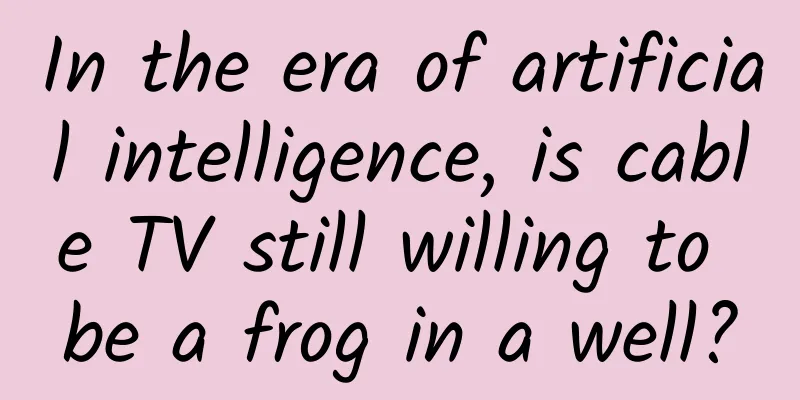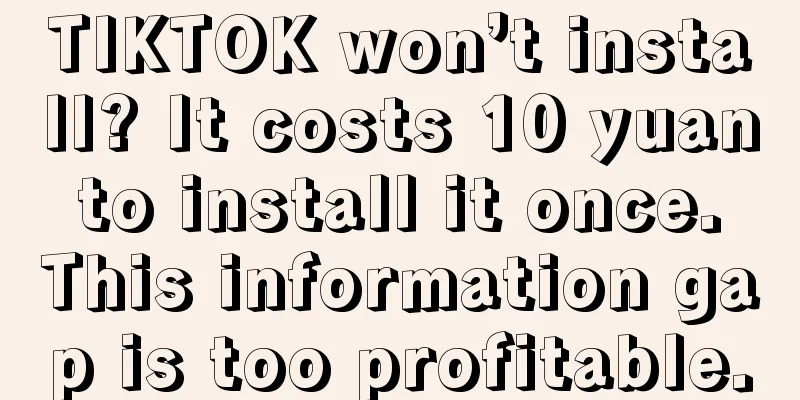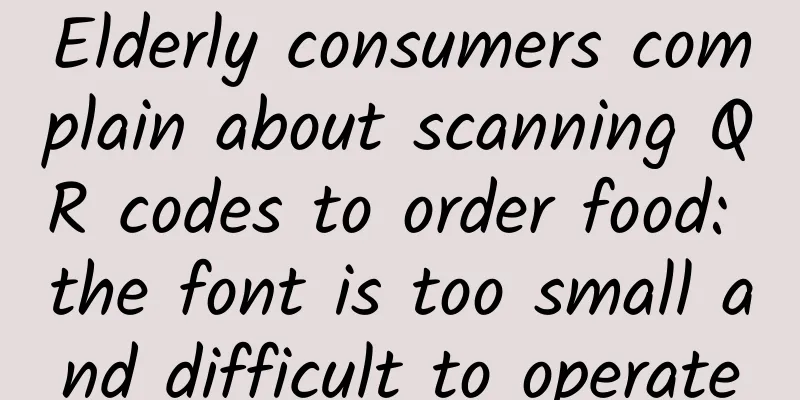In the era of artificial intelligence, is cable TV still willing to be a frog in a well?

|
Go to the Consumer Electronics Show (CES) to heal your wounds After a tough 2017, if the defenders of cable TV can recover from the pain of losing subscribers, they should hurry up and go to the Consumer Electronics Show (CES) in Las Vegas, USA. I think there are two benefits to going to CES. First, you can think about why the TV industry has been so sad in the past two years through the exhibition; second, you can feel the expectation that almost all industries will be subverted after the popularization of artificial intelligence in the near future. Perhaps this greater sense of oppression will make you forget the pain of these scratches and small injuries on your body. Even if it cannot help you find a way to liberate yourself immediately, it can at least numb yourself. It is not just the radio and television industry that suffers. No new video technology breakthroughs I haven't been to CES for two years. I remember going to CES in 2015. The hot topics were 4K, VR and wearable health electronics, and the update of video technology was still the theme of CES. But at CES in January 2018, it was difficult to see revolutionary breakthroughs in video technology. The 8K resolution ultra-high-definition display still seemed flashy, and the rollable and foldable flexible screen did not seem to have discovered any valuable application scenarios. There were many VR displays, but it seemed that they did not even exceed the effect when OCULUS was acquired by FACEBOOK in 2014. If we have to discover a potential video product, it is that image detection technology such as face recognition has some highlights. Several major domestic appliance manufacturers showed up, and the main products on display were still TVs, but apart from being bigger and thinner, there was really nothing new to say. In fact, looking back at the past few years of CCBN, there were not many new things in terms of technology or applications, and the participants were all old faces, and they had long seemed to lack stamina. Maybe radio and television technology and even Internet-based video technology have developed to a relatively high level of technology, and it is difficult to make a big breakthrough, or the existing technology has already met the needs of users, and there is no strong motivation for the development of new technologies. In an industry without new technology drive, how can enterprises in the industry compete? It seems that they can only focus on non-technical aspects such as copyright, content, IP, stars, and creativity. This explains why the cost of purchasing a single episode of a phenomenal TV series has risen sharply from 1 million five years ago to 13 million now. It is not difficult to understand why the three Internet video companies, iQiyi, Youku, and Tencent, still suffered a total loss of 20 billion until the past 2017, because they are also caught in a fierce competition of technological homogeneity - content production and procurement war. Internet-based video users have no loyalty at all, so no Internet platform dares to buy less high-cost copyright programs to reduce some operating losses, because users will double the loss to competitors. Thinking of this, I can't help but sigh like Ah Q: "We used to be much richer than you! Who do you think you are?" Artificial Intelligence (AI) Becomes the Main Logo of 2018 CES Compared with the lackluster video technology, artificial intelligence technology was widely demonstrated in various fields at this year's CES. From drones to household robots, from engineering robots that can play table tennis to driverless electric cars. Although AI technology is still somewhat immature, so many global technology elites are making every effort to use big data technology, Internet of Things technology, new energy, 5G communication network, voice and video recognition, and automated control mechanical technology to rapidly approach and soon surpass the limits of human capabilities. I don't know whether I should cheer or feel a chill! We know that the process of machines replacing human work has begun. We have fully realized unmanned automatic license plate recognition and deduction when entering and exiting parking lots in big cities, and soon there will be no need for cashiers on highways; then there will be the birth of unmanned supermarkets, eliminating the living space for store clerks; bar waiters become robots, and last week a bar with touch screen self-service menu payment and robotic arms automatically mixing cocktails opened in the United States; JD's "Asia No. 1 Warehouse" is basically completely automated assembly line operation without human intervention, and will the drone test eventually replace the jobs of tens of thousands of JD couriers? Will future wars not require soldiers, but will they just be a competition between countries' drone technologies? Industry 4.0 and unmanned factories in the manufacturing industry have been implemented in great strides, and the maturity and popularity of unmanned electric vehicles will completely change the energy structure and social division of labor. Even in the medical field, with the improvement of the ability of the health Internet of Things to collect data, the advancement of human genetic modification technology, and the improvement of data mining and disease machine diagnosis capabilities of medical diagnosis and treatment big data, doctors' medical judgments and prescriptions may be replaced by machines, not to mention precise minimally invasive and laparoscopic surgeries. Since the beginning of the Internet era, new formats, business models, and new technologies have emerged one after another, like a runaway car with broken brakes, constantly subverting, rewriting, replacing, and even eliminating existing business processes, forcibly bringing many unrelated industries closer together, and forming large-scale cross-border penetration and competition. From this perspective, the competition from IPTV and Internet TV currently faced by the cable TV industry is really child's play. Instead of worrying about how many years cable TV can last, we should worry about whether our children can find a common job when they grow up, such as farmers, workers, drivers, couriers, cashiers, store clerks, chefs, typists, translators, tour guides, security guards, forest rangers, firefighters, and doctors, in addition to participating in sports competitions, singing, dancing, painting, writing novels, acting, teaching, or being civil servants and often participating in debates? On the other hand, if we can calmly study the major changes in human behavior order when the AI era arrives, then can we easily reduce the dimension and think about it. When IPTV and Internet TV impact cable TV, can we also make some small and effective work reorganization and response? Can the thinking of cable TV people catch the rhythm of the world's beating, jump out of their own small acre and three-point field to explore a larger space for decision-making and reorganization? Thinking of this, I felt like a frog that had jumped out of the well without realizing it, looked at the endless, ever-changing starry sky, took a deep breath, and from then on I no longer worried about the other reptiles that always wanted to jump into the well to grab food. Worrying all day long would not help anyway. Home appliance giants playing the smart home card Smart home has been "popular but not popular" for many years, but now with the addition of artificial intelligence to the Internet of Things, the final breakthrough in commercialization seems to be at hand. From Samsung, LG, Sony to Haier, Hisense, TCL, Skyworth, Changhong, Konka, Suning and other Chinese and foreign companies are actively promoting it. Which ones have real market significance? From my personal perspective, products like automatic curtains, automatically opened rice cookers, and refrigerators that can access the Internet seem to be a bit out of touch. However, if we do not strictly distinguish between household appliances, electronic devices, and smart homes, home security alarm and monitoring systems, smart door locks, fresh air systems, water purification systems, kitchen garbage disposal systems, and a variety of kitchen appliances that integrate the Internet are already in a high-growth market segment. Since these products and systems need to be installed and even involve weak current soft decoration, I personally think this is an effective way for cable TV operators to increase revenue and expand the scope of user services to lock in users. If today's cable TV operators still think that we are only suitable for selling TV products with a gross profit of less than 10%, then jump out of the well and participate in exhibitions other than CCBN and ICTC. You will find that the front-line employees of cable TV are really suitable for selling, installing, and maintaining smart home systems. The hottest star in the smart home industry is the smart speaker, whose core is the backend voice interaction ecosystem, such as Amazon's Alexa, Google's Google Assistant, Baidu's DuerOS and Alibaba's AliGenie. These are likely to be the future of home intelligence, but if you have tried Amazon's ECHO or Xiaomi's speakers, you will probably agree with me that they are still some distance away from our reality. The enlightenment of Toyota's transformation - open platform The North Hall of the Las Vegas Convention Center has completely turned into an auto show this year, with all the top auto companies gathered here. Strictly speaking, it is an exhibition of smart cars, driverless cars, and electric cars. The electrification and Internetization of the automotive industry remind me of the era of MTK copycat phones, and also of the new round of reshuffles in the mobile phone industry launched by GOOGLE's Android system. Today's leaders in the Chinese mobile phone market, Huawei, VIVO, OPPO, and Xiaomi, hardly appeared in your field of vision before that reshuffle, right? How can you be sure that BMW or GM will not follow the footsteps of Nokia or Motorola? Is this a revelation to cable TV people on the edge of the cliff? Changes in the industry environment do not necessarily lead to the collapse of traditional companies, but if you insist on not changing and fail to keep up with the times, the collapse may come faster than you think. Today, it is still Google's ANDROID PLAY and Apple's CAR PLAY that can realize functions such as remote vehicle start, remote vehicle monitoring or remote in-car climate control based on 4G wireless communication networks; if it is an electric car, the charging settings can also be remotely controlled. These platform capabilities have greatly reduced the development threshold for new entrants into the automotive field, such as Jia Yueting's Faraday. The electrification of automobiles has eliminated the technical barriers of complex diesel and gasoline engines and transmission systems accumulated by traditional car companies such as General Motors and Ford over a hundred years. So, the "copycats" broke in. These "automotive laymen" include Internet companies such as Baidu and LeTV, as well as home appliance companies with brands and sales channels such as Skyworth and Konka. There are BYD or Yinlong, which have extended from the battery industry, and Bosch and Dyson, which have transformed from the electrical appliances and motor fields. Dyson? You are right, it is the brand of your portable vacuum cleaner. Dyson has also launched a prototype electric car this time! Among them, Toyota gave me the biggest conceptual impact. On January 8, Toyota held a press conference at CES. Mr. Akio Toyoda announced that Toyota is "no longer a car manufacturer" but a "mobility company" and that Toyota's competitors are companies like Google, Apple and FACEBOOK. Toyota launched an E-PALETTE concept car platform, which forms an API for all basic functions of automotive hardware and software, including battery drive, vehicle control, driving, status monitoring, location and driving information, dynamic management, sensors, cameras, and autonomous driving systems. All interfaces are open to the outside world, allowing third-party companies to design application software based on different application scenarios, and freely transform into vehicles for logistics, express delivery, camping, small mobile supermarkets, temporary hotels, shuttle buses, mobile restaurants, ride-sharing services, etc. Toyota has built an industry alliance for this car, including Amazon, Didi Chuxing, Pizza Hut, UBER, etc. I really envy Toyota, a big name in the industry, who can start a transformation and upgrading plan at the height of its success. However, the promotion of the mobile travel plan will inevitably affect the direct sales of cars. Whether Toyota can overcome the difficulties of transformation remains to be seen. Small Thoughts The cable TV industry has also been calling for platformization for many years, but it has only offered some value-added services for interactive users, attracting some small development service providers who do not have a revenue scale. It is a weak alliance with very limited effect. Why can't we attract some industry giants to form alliances? The reason is that the platform resources provided by the integration are not attractive enough. Furthermore, it is because they have not seen clearly what the core resources left by cable TV in the past 20 years are, and there has been no effective training, transformation, and packaging to form credible cooperative resources. After a year of discussion, cable TV has basically formed two major development paths: one is to ask the government for policies and information projects, and the other is to develop new business products and carry out industry strategic restructuring based on user life needs. As a weathervane of the global consumer electronics industry, CES can undoubtedly give us some inspiration. We can no longer stick to an industry with slow technological growth and obvious cross-border substitution risks. If you have time to feel the pulse of the world's information development, maybe the wall in your heart will naturally fall down. As a winner of Toutiao's Qingyun Plan and Baijiahao's Bai+ Plan, the 2019 Baidu Digital Author of the Year, the Baijiahao's Most Popular Author in the Technology Field, the 2019 Sogou Technology and Culture Author, and the 2021 Baijiahao Quarterly Influential Creator, he has won many awards, including the 2013 Sohu Best Industry Media Person, the 2015 China New Media Entrepreneurship Competition Beijing Third Place, the 2015 Guangmang Experience Award, the 2015 China New Media Entrepreneurship Competition Finals Third Place, and the 2018 Baidu Dynamic Annual Powerful Celebrity. |
Recommend
KOL is too expensive, do you know more about KOC marketing?
There is not enough budget to continue looking fo...
"Space Express" is delivered! The launch of Tianzhou-7 was a complete success
At 22:27 on January 17, the Long March 7 Yao-8 ca...
How to create a Zhaoqing food ordering app? How much does it cost to develop a food ordering app?
The catering industry has become the first choice...
How to write a good article title for WeChat public account?
There is no doubt that the title of an article is...
iPhone 6: Bigger but less classy
Early this morning, Apple held its annual new pro...
The financial report is lower than expected, and NetEase Games has lost its self-developed "engine"
It has been a month since Blizzard games ceased o...
Will I be iodine deficient if I stop eating seafood?
In the age of universal iodine supplementation, p...
World Migratory Bird Day: It is said that migratory birds fly south, but where exactly does “south” refer to?
Zhong Zhenyu May 11 is World Migratory Bird Day. ...
Shandong's high school entrance exam really has a cooking test! How many points can you get for this "scrambled eggs with tomatoes"?
A few days ago, a piece of news appeared online, ...
Facing Ideal L7 and Mercedes-Benz GLC, can the BMW X3, which is comparable in size to X5 and has an official price reduction of 50,000 yuan, win?
When traditional luxury brands give enough, there...
How to acquire more users at low cost?
When an operator wants to promote a product, he s...
36 data analysis tools you must know!
Today's mobile applications are no longer tool...
The game is so small that it is less than 1KB
As games get better and better, their size also i...
It turns out that boys are thicker-skinned than girls, it's true! I can't keep calm after reading this...
This article was reviewed by: Xiaobo Zhou, Doctor...
Is it to save the entire film market, or to save domestic films?
In December 2014, the Lunar New Year box office s...









